For years, their orders came from the Army. Now, married vets take orders through a window.
Retired Army veterans Tyrone and Ceslie Jenkins don’t just wear their military pride on their sleeves when they go to work.
They don’t just wear their pride on their legs, either, although you can often find them covered in camouflage pants when the Rock Hill, South Carolina-based couple is on the job.
No, the fact of the matter is that, when it comes to the food-truck business they launched together nearly 3-1/2 years ago, the Jenkinses wear their pride in their military service everywhere.
It’s an influence that bleeds into everything from Salute Chew’s company logo — which uses a silhouette of a saluting soldier in place of the lowercase “L” in “Salute” — to the words “Veteran Owned & Operated” standing out as the largest ones displayed on the side of the truck. There’s even an armed-forces flavor to the menu, which groups seafood options under the heading “Navy SEALS”; fowl under “Air Force Birds”; salads under “Marine Greens”; and anything off the grill as an “Army Grill Sergeant” offering.
Tyrone, who retired in 2014 as a Sergeant First Class after 22-1/2 years (and who is called T.J. by friends and family), has no qualms about going all-in on playing up the armed-forces theme. “Yeah, we get quite a bit of jobs just off of that.”
“I’m driving to a job,” he explains, and ”because the (phone) number’s on the truck, people literally call and say, ‘Hey! My dad was in the Army. … Thank you for your service. Where you headed?’ I tell them, then the next thing you know I get to where I’m going and they’re waiting on me to set up.”
Salute Chew and its Lowcountry Southern cuisine have steadily gained popularity since the mobile kitchen and catering company was co-founded by the Jenkinses in May 2020. Today, the truck works deployments all over the area, including outside of schools, medical centers and office buildings, at festivals and holiday celebrations, and more.
And as T.J. and Ceslie push toward the food truck’s fourth anniversary, they do so with plans to grow further: There’s talk of opening a takeout- and/or delivery-only operation in Charlotte to add to their arsenal.
But none of this has come easily.
Here are 17 things to know about Ceslie and T.J. that will give you a greater appreciation for how — in spite of significant odds — they’ve pushed their Salute Chew idea to be all that it can be.
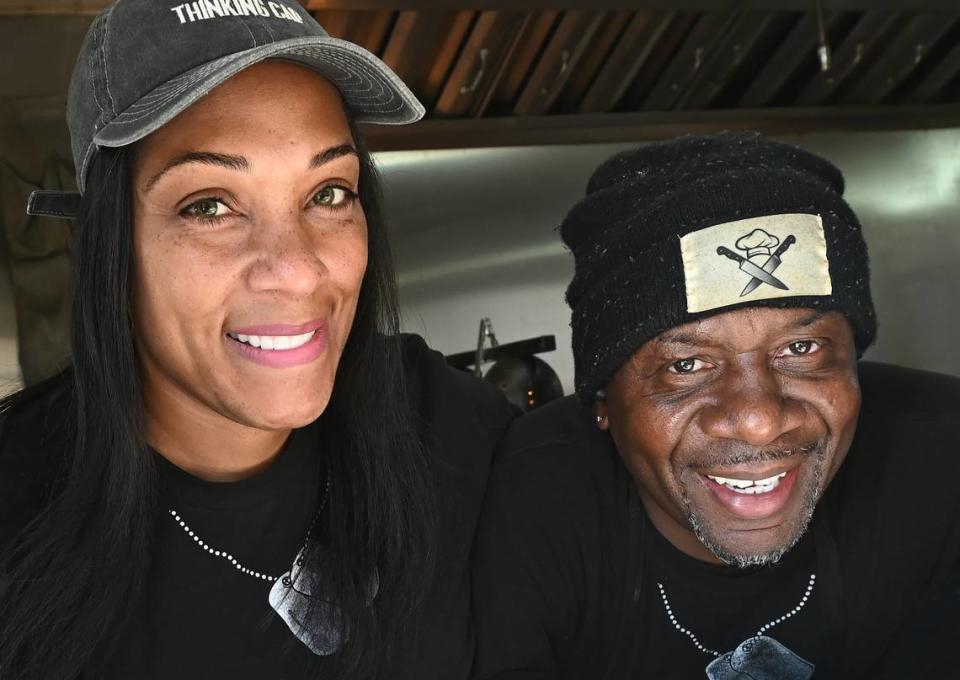
1. T.J.’s earliest experiences in a kitchen came when he was a teenager growing up in Mount Pleasant, South Carolina, where he started working at a restaurant at 15 years old. He was hired as a dishwasher, but by the time he left to join the military he was working the sauté station.
2. T.J. remembers having the television on in the background while working on his homework one afternoon, when a U.S. Army commercial — one that would eventually become iconic — caught his attention. “We do more before 9 a.m.,” the voice-over boasted, “than most people do all day.”
It planted a seed that led to him enroll first in Advanced Individual Training in Virginia in 1990, and eventually as an active-duty soldier in the Army in 1992.
Ceslie’s motivation was even simpler: “I just knew I had to do something,” she recalls, “but I didn’t want to go to college. (The Army) was the most effective way to be productive, and have a job, and earn money.”
3. Ceslie and T.J. met in December 2000 when they found themselves stationed together at Fort Bragg, and despite a more-than-nine-year age difference they immediately bonded over the fact that they both hailed from the Charleston area — him from the town of Mount Pleasant, her from the West Ashley area.
4. During their courtship, they were separated by Army reassignments and did the long-distance thing for a while. They were moving toward marriage all along, but it ultimately happened more quickly than they anticipated: In June of 2004, as the Iraq War intensified, T.J. learned he was being deployed overseas; worried about ... well, everything — including whether or not they’d ever see each other again — they went to the courthouse to get married on July 3, 2004, having been granted a dispensation to be together by the Army despite being officially stationed at separate bases.
By August, T.J. was in Iraq.
5. They both had close calls during overseas deployments. At one point, right after TJ walked out of a dining hall at a base in the Middle East, explosive shells from a mortar rained down on the hall. At another, Ceslie was given orders to go with a convoy but was reassigned to a different task before it left; that convoy wound up being hit with an improvised explosive device (IED) that killed multiple military personnel.
“That could have been me in that convoy,” Ceslie says. “So that’s something that I think about even when I don’t want to think about it. ... Been 20 years almost and I still have thoughts about those things. ... Why did I get pulled? And if I hadn’t, would it have been me?”
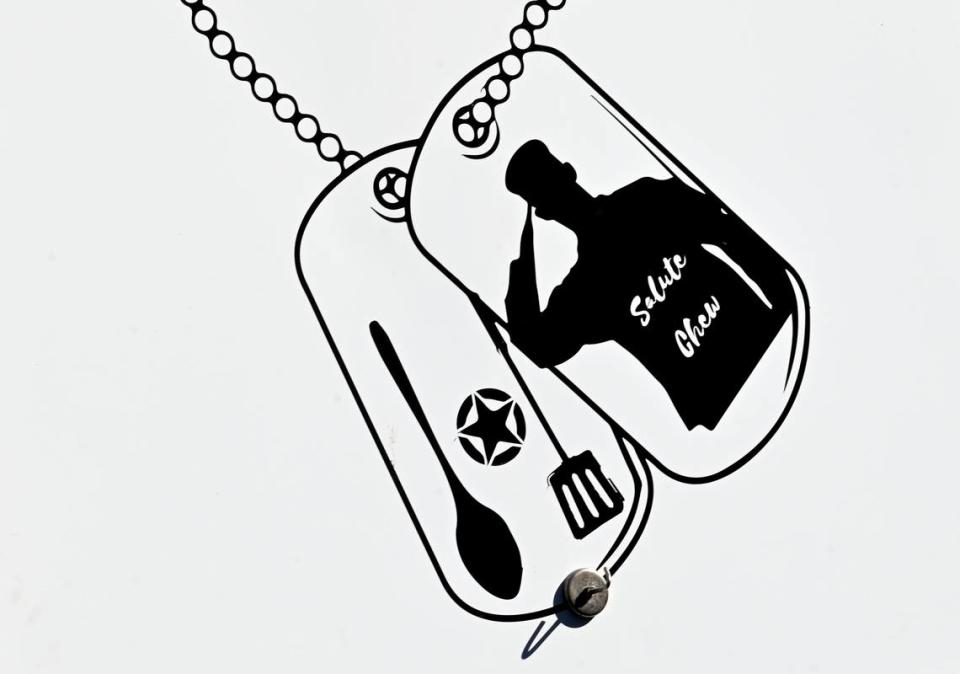
6. Ceslie, an Army specialist, sustained neck and back injuries in a motor vehicle accident during a dust storm in Kuwait City, and eventually was given a medical discharge in 2006 while she and T.J. were expecting their first child.
7. In June 2006, while preparing to be sent back for a second deployment to Iraq, T.J. was participating in a training exercise at Fort Irwin, California, in the Mojave Desert when a severe dust storm was kicked up. “It was so thick you couldn’t even see your hands in front of your face, in the daytime,” he says.
It would change his life forever.
Within a couple of months, he had developed a cough that wasn’t just irritating, but painful. As that persisted, T.J. became unable to hold down most of the food and drink he tried to ingest, and his weight plummeted more than 50 pounds in a matter of months.
At his sickest, he not only couldn’t get himself up the stairs of their house, but he could barely walk.
After submitting to a battery of tests and cycling through multiple doctors who couldn’t nail down a definitive diagnosis, T.J. says, one finally figured it out: He had disseminated coccidioidomycosis, an infection caused by a fungus known to live in the soil in the southwestern U.S. Most people who breathe in the spores don’t get sick, according to the CDC. T.J. did, and though it was caught before the damage was made even worse, he’s still going to have to take an antifungal medication for the rest of his life.
If there’s a silver lining? “It prevented me from deploying again to Iraq. ... I know we lost a lot of soldiers over there. It wasn’t a good place to be. So maybe that was just (for the best, for) me not to go over there.”
There was a push to get him to take disability retirement. But he refused. “There’s no way,” T.J. says.
He had 16 years of service at the time. He wouldn’t retire for nearly seven more years.
8. T.J. says he was never a cook in the military. But in the early 2010s, while stationed in Germany, he found himself back in the kitchen for the first time since he was a teenager. Without any formal training or recipes, just using inspiration from family meals he enjoyed growing up, he would make big pots of chili and bake cornbread for members of his unit — to rave reviews.
“People would say, ‘Man, this is really good. I didn’t know you knew how to cook like this,’” T.J. recalls. “I didn’t know it either! I just thought it was just some stuff I threw in a pot.”
He continued whipping up well-received Southern family-style dinners for fellow servicemen after returning stateside to finish out his military career at Fort Leonard Wood in Missouri. By this point, T.J. and Ceslie also found themselves wondering aloud what it would take for them to open a restaurant.
Eventually, T.J. decided what the answer was: enrolling in culinary school. After retiring in 2014, he settled on the Art Institute of Charlotte, and moved Ceslie and their two daughters (then ages 4 and 8) to North Carolina before the end of the year.
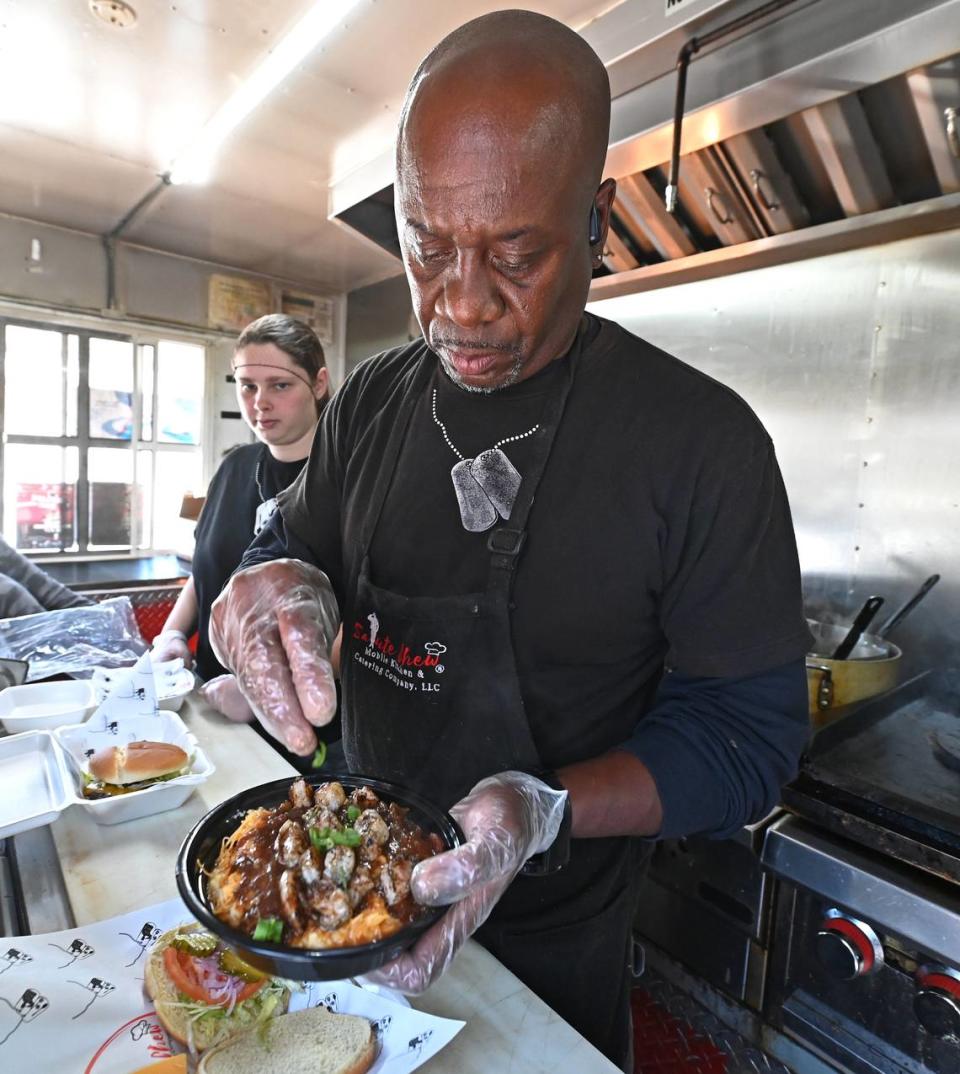
9. In culinary school, T.J. befriended a fellow veteran with whom he started a small catering business — with T.J. serving as a savory chef and his friend as a pitmaster. T.J.’s cooking skills were maturing. He started writing down recipes and actually following them. But the catering venture didn’t last, and after completing his school’s program in 2016, T.J. took a job teaching culinary arts at Applied Technology Center, a public high school in Rock Hill.
The Jenkinses periodically continued talking about the restaurant idea, but also — largely because the overhead costs were so much lower and because they could take it anywhere they wanted to — a food truck.
But “something always came up,” Ceslie says. “And ... just mentally, we probably weren’t ready at that time. We had to go through some things first, to (be ready for) what we were gonna need to do this.”
10. When she says something always came up, she means it. And not in a good way.
In March 2017, Ceslie says, one of their daughters was badly injured in a trampoline accident, lived with a traumatic brain injury that went undiagnosed for 2-1/2 years, and still hasn’t fully recovered.
In May 2017, Ceslie started experiencing headaches and difficulty thinking, speaking and finding words, and in December 2018 was finally diagnosed with a small brain tumor.
In January of 2018, T.J. was involved in a head-on vehicle collision in Rock Hill, and although he walked away with minor injuries, Ceslie thinks it’s part of the reason their 17-year-old daughter hasn’t wanted to start driving yet.
11. Then the pandemic started. Ceslie was doing her administrative job with Rock Hill Schools from home. Their daughters were being schooled from home. T.J. was teaching virtually. Within a month, being stuck at home was driving T.J. nuts.
“I gotta stay busy,” he says. “I hate sitting around. I gotta stay busy.”
And what’s his favorite way to stay busy? Cooking. So one day in April 2020, without thinking too hard about it, he hopped in his truck, drove down to Charleston, and bought a couple bushels of crabs, a bunch of shrimp, some clams and mussels. Then he posted on Facebook about his fresh seafood haul and announced he would be taking lunch orders.
T.J. and Ceslie both may have underestimated the demand.
“I started getting all these messages and messages and messages,” T.J. recalls. “I think I was up to about 60 (before I had to cut it off).” Ceslie, meanwhile, says she was at a doctor’s appointment when people started arriving in their cul-de-sac to pick up their food, and that when she returned to their neighborhood, she couldn’t get to their house because the street was so full of vehicles.
That night, after everyone had finally cleared out, Ceslie put the food truck idea in front of T.J. again, with authority: “This is your confirmation right here that we can make this happen. Are we gonna do this, or what?”
Within a matter of weeks, they formally created the LLC. Ceslie used the internet to teach herself what she needed to know about running a business and creating a website.
They did a soft opening in June. Right after their 16th wedding anniversary on July 3, Salute Chew officially opened.
The following month, in August 2020, she had brain surgery to have the tumor removed. She was back to working on Salute Chew business from her recovery bed the very next day, and was back taking orders from the inside of the truck just two weeks later.
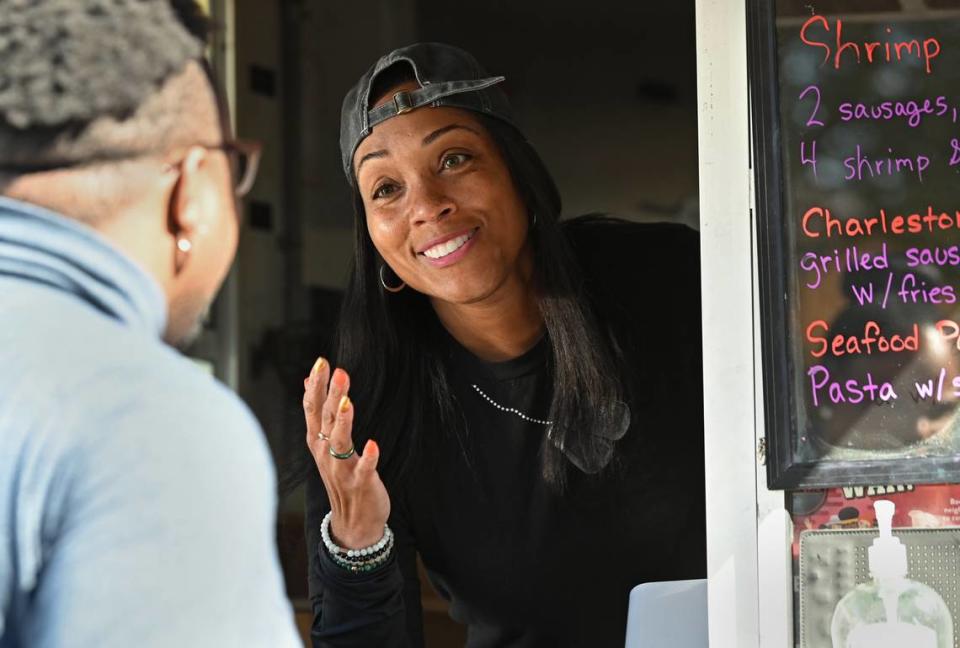
12. COVID made a food truck make even more sense. “People couldn’t go eat, so we brought the food to them,” Ceslie says.
13. Within less than a year, they were regularly requested to park Salute Chew outside various office buildings, in neighborhoods, and at schools (for lunching faculty and staff) in Rock Hill, Fort Mill, Charlotte and the surrounding areas.
Business was good enough by summer 2022 that T.J. decided to leave his teaching job at Applied Technology Center to focus on Salute Chew full time. But he has maintained a link to that experience: The food truck’s staff is comprised of former ATC students who went through his classroom there.
14. Ceslie has largely kept to the business side of the operation, leaving the cooking to T.J. and his former students.
“I think the first time I tried to cook something for you was the first time I tried to cook,” Ceslie says, laughing, as she recalls a “disaster meal” she made when the two first started dating. “It was not good. I am well aware, so you can go ahead and say it.”
“Salty. So I got high blood pressure today,” T.J. says, shaking his head and laughing. “But she tried.”
So she is the main creative force behind Salute Chew, coming up with the food truck’s name as well as with the many fun plays on military-themed words in the menu.
(Fun fact: She offered the name first to T.J. and his culinary school cohort when they were doing catering, but someone working with them decided to add an ampersand to make it “Salute & Chew.” She always liked her original idea better, and was happy to eventually get to stick the name on their truck.)
15. There have certainly been challenges. The Jenkinses say they’ve occasionally felt like they were treated differently because they’re Black.
For example, Ceslie says “oftentimes I think people have the mentality that everything is going to be cheaper off the bat. ... If they were to go to another restaurant (owned by non-minorities) that charges the same prices, I feel like they would have no problem paying the same. ... Just their demeanor and some of the conversation kind of gives that vibe, that it’s related to that.”
“There’s times when we have to encourage each other,” Ceslie admits. “Because there’s times when he’s overwhelmed and stressed and he’s like, ‘You know what? Forget this.’”
16. But like they’ve done so many other times in the face of adversity, they’ve soldiered on. “To really just survive as a family and just function as a family and just live normally has just been a lot,” Ceslie says. “I’m like, There’s no way it’s supposed to be this hard. This many issues. There’s no way that (this many) things can happen to one particular family all the time. ... But it does, and it did, and it has. And I kind of feel like it puts us in place to deal with certain things with this business. To maybe get to the next level.”
“I look back on (everything that’s happened and I’m) like, OK, was that you, God? Did I need to go through that to be able to handle this situation?,” Ceslie continues. “That’s how I look at it. I try to take each experience or each obstacle and figure out what the lesson is.”
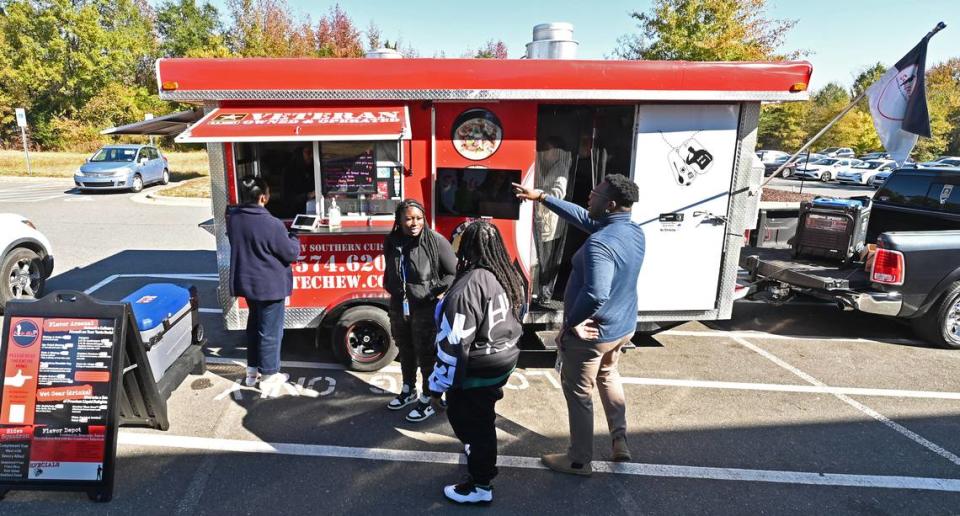
17. And in the end, although they certainly sacrificed their health for their country (Ceslie has chronic pain stemming from that 2006 crash, T.J. has a chronic cough due to his Valley fever), they’re as proud as ever to be veterans.
T.J. says people come to the window all the time to ask them which branch they served in, and Ceslie says the public’s reaction to the military theme is overwhelmingly positive: “I feel like when it comes to that, people do not care your color, any of that stuff. You’re just brother or sister then.”
“We all make decisions in life,” T.J. adds, “and that’s the decision I made. I’m not a recruiter. I’m not trying to get you to join the military. But if you don’t have a plan, I mean, why not experience it?”
“Who pays you to stay in shape, man?” he continues, chuckling. “If it wasn’t for that, I’d probably (be) big as a house. … So ... I don’t regret it one bit.”


